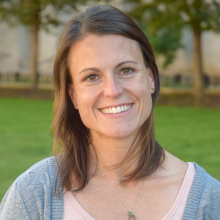February 2014 Spotlight on the SRCD Policy Fellow: Nina Philipsen Hetzner, Ph.D.
2013-2014 Federal Executive Branch Policy Fellow
Early in my graduate work I realized I was primarily interested in research with policy relevance. I wanted to contribute to work that influenced change for children and families on a large scale, from the top down. It wasn’t long before I was exploring non-academic possibilities for my career and my advisor pointed out the SRCD Policy Fellowship. The fellowship remained on my radar throughout graduate school and, after I received my PhD, I applied.
I am now in the middle of my first year as an SRCD fellow placed in the Office of Planning, Research and Evaluation (OPRE). As the research arm of the Administration for Children and Families (ACF), OPRE is primarily responsible for studying the programs and the populations served by ACF. The work conducted at OPRE includes evaluations of existing programs, evaluations of innovative approaches to helping low-income children and families, research syntheses, and descriptive and exploratory studies. Most of my work at OPRE is on Head Start research projects, a slight shift from my graduate work, where I focused on early childhood environmental influences more broadly. I am involved with the Head Start FACES Project, two workgroups focused on topics related to children’s transitions from Head Start into elementary school, and several projects on Head Start programs’ use of their own data to inform classroom practices and program functioning.
In addition to my assigned project work, I have also had opportunities to sit in on meetings, presentations, and workgroups with federal staff, contractors, and academic researchers to observe and learn. As an SRCD fellow, I have attended meetings that are reserved primarily for senior staff and experts in the field. Having the ability to observe the leaders of our field in action has been one of the most valuable and influential aspects of the fellowship made possible by the willingness of our OPRE colleagues to teach, mentor, and make many experiences and opportunities available.
Through these experiences, my understanding of “policy research” has shifted a great deal. There are simple things that I have learned: for example, large, government funded studies often include a “feasibility phase” before the larger study is launched (who knew?). And there are also complicated things that I am just beginning to understand: for example, how the interplay between research and government-run programs is not as straightforward as I previously (and naively) believed. By collaborating with the Office of Head Start I have observed how researchers can tend to focus on questions that are theoretically interesting, but not practically applicable.
I have also learned some of the challenges of bridging the gaps between research, practice, and policy. For instance, sometimes translating research findings into actual on-the-ground actions is complicated by program impacts not being uniform across populations served. Also, I have had to face the limitations of what I thought was a pretty exhaustive body of early care and education literature. We do not (and may never) have definitive answers to the many basic questions: What’s the “best” dosage of early childhood education? Per day? Per week? Per year? What aspects of program and classroom quality have the most meaningful impact on children’s school readiness outcomes? How do we measure quality and child outcomes in a way that is useful and valid?
While challenges exist, I am learning about the productive partnerships between OPRE and the program offices and how the system is constantly moving toward making research more useful to programs—and vice versa. I am also beginning to understand that federal offices, think tanks, research firms, academics, and others approach these issues from different angles. There are many forces at play on any given issue, tugging and pulling in various directions. Because of these opposing forces, the field moves slowly toward an accepted consensus on an issue, self-correcting along the way.
I am very grateful for the experiences I have had thus far as an SRCD fellow. I deeply appreciate the people I have met who have significantly impacted my thinking and understanding. As I move into the second half of this fellowship year, I look forward to continuing to learn about the impactful work on early care and education at the federal level.
